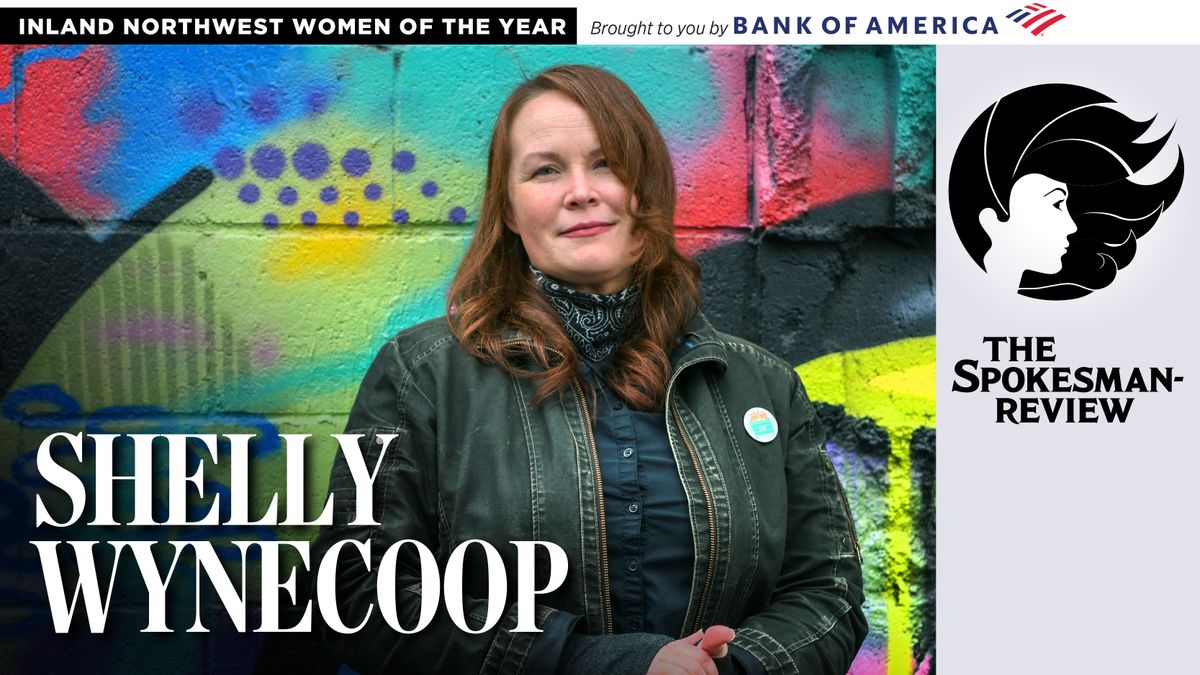Shelly Wynecoop found refuge in art, education

When Spokane Arts needed a grant administrator to help fund local art projects, executive director Melissa Huggins was told over and over again – hire Shelly Wynecoop.
“When Shelly applied for the job – and I didn’t know her personally before she applied – I can’t tell you how many people said you’d be absolutely crazy not to not to hire Shelly,” Huggins said.
Wynecoop has served as grant administrator since 2017. In her experience, Wynecoop said, art has helped her learn and make sense of her busy life.
“I really see art as an act of shifting perspective,” Wynecoop said. “Education is a much broader kind of thing, not just sitting down and learning something in a classroom, you know, it’s exposure. And I am still a big believer in that.”
As grants administrator, Wynecoop oversees applications submitted by local creatives who want their projects funded. She works directly with those artists, often art students, to strengthen their proposals, she said.
Wynecoop has been directly involved in the success of several Spokane artists’ projects, said Karen Mobley, art contractor for Spokane Arts. One of Wynecoop’s strengths is her understanding of young artists and students, Mobley said.
“For somebody in the community who has a professional job to treat an art student as a real peer and to make sure that they understood what they needed to do – that’s the kind of respect that a lot of people, when they’re starting out, don’t really get,” Mobley said.
Wynecoop said she remembers the frustration of having a grant application denied without getting any feedback as to why. Without support, young artists can easily feel discouraged, she said.
Until later in life, Wynecoop said she rarely considered herself an artist.
“It turned out that I’ve actually spent most of my life in the arts, but I just never identified that way,” Wynecoop said.
Wynecoop grew up on a ranch on the Spokane Indian Reservation. After high school she left for Oberlin College in Ohio to study physics and clarinet. Not far into her undergraduate studies, Wynecoop was drawn to anthropology and linguistics. She got involved in cognitive science research at Stanford University and then pursued her graduate studies in linguistics and studio arts at the University of Chicago.
“The arts have always acted as kind of a refuge for me,” Wynecoop said. “I was involved in more academic or scientific pursuits, so when I needed to kind of regroup and loosen up a little bit, I would find myself back in the arts again.”
Wynecoop traveled and worked across the United States and internationally, but found herself back in Spokane in 2006 when her daughter was about a year old. They had been living in Ireland at the time with her child’s father, but the relationship didn’t work out.
“My choice at the time was either to go back to New York as a single mom and never see my kid because you’d have to put her in day care or stay home,” Wynecoop said. “Looking back it was absolutely the right choice to come home.”
When she returned to Spokane, Wynecoop soon became the chief executive officer of the Spokane Tribal College. She said she explored the intersection between culture and education there, herself being a descendant of the Spokane Tribe. She often found herself learning along with her students, Wynecoop said.
“I was working directly with my family and hopefully offering that same opportunity for them to reach out and experience the world in different ways,” Wynecoop said. “I won’t say it was easy. That was difficult. And there were a lot of goals that I did not feel like I met, but it was an amazing education for me about a lot of very complex and deep things.”
Wynecoop became an involved and “well-respected person in the community,” Huggins said.
Working with students and artists through the grant program at Spokane Arts has been immensely rewarding, Wynecoop said.
“I love this program. I think it’s doing great things for the community,” Wynecoop said. “It’s actually really unusual for a city the size of Spokane that’s inland to have something like this that supports the arts the way that this does. It’s a real privilege, it is an honest-to-God privilege, to be able to create something that at least tries to avoid all those frustrations I had coming from their perspective.”